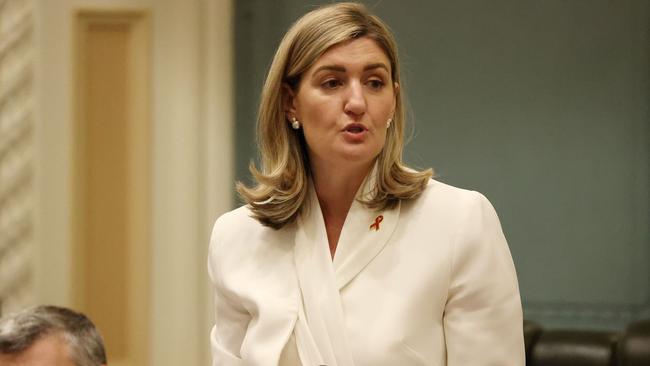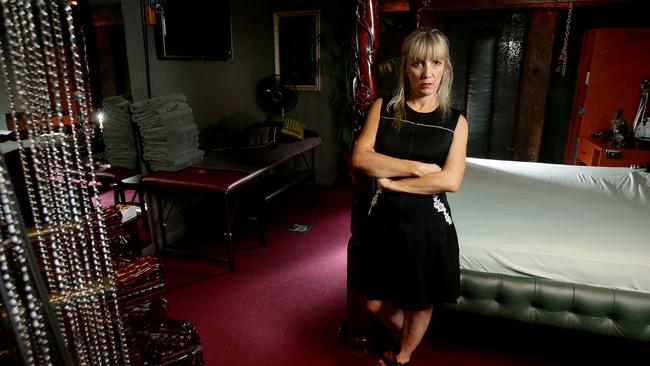Queensland sex workers reveal violence and stigma sparked by current laws
Queensland sex workers have revealed the isolating and scary conditions they say put them at unnecessary risk and how they believe a decriminalised industry would reduce violence.
QLD Politics
Don't miss out on the headlines from QLD Politics. Followed categories will be added to My News.
Queensland sex workers believe a decriminalised industry would reduce violence, abuse and stigma.
Ahead of the Queensland Law Reform Commission’s report into how a decriminalised sex industry would be regulated, a number of sex workers have told The Courier-Mail of the isolating and scary conditions that have put them at “unnecessary risk” for decades.
Terms of reference for the report are expected to be delivered to Attorney-General and Justice Minister Shannon Fentiman by March 31.
DecrimQLD campaign leader Janelle Fawkes said current legislation outlawed sex worker safety strategies such as letting another sex worker know where you are on a booking, checking in at the end of a booking, driving another sex worker to an outcall, hiring a receptionist to screen bookings and working in pairs.
Ms Fawkes, who is also a spokeswoman for the sex work advocacy group Respect Inc, said the Prostitution Act 1999 introduced a brothel licensing system, established the Prostitution Licensing Authority and criminalised all other sex industry business models.

She said the Police Powers and Responsibilities Act 2000 allowed police to entrap sex workers while posing as clients, and provided immunity if they requested and undertook illegal activities.
She also said migrant women who spoke English as a second language were “heavily criminalised” and frequented targeted.
“The laws prevent sex workers implementing safety strategies by criminalising safety strategies,” Ms Fawkes said.
“Most sex workers are impacted by the policing strategies in Queensland – the use of entrapment which means that you never know whether the person calling you is a real client or police posing as a client.”
Ms Fentiman said feedback from the sector indicated current laws criminalise safety strategies used by sex workers.
“No Queenslander should have to choose between working legally and being safe at work – including our sex workers,” she said.
“We need to ensure appropriate and modern laws are in place and that these are also in the best interests of the community.
“A key focus of this review is the safety of workers and putting in place proper regulation, so the industry doesn’t operate in the shadows.”
But a Queensland Police Service spokeswoman said the service was committed to protecting the safety of all sex workers working within the industry and community, and disrupting organised crime, but that all matters were investigated using lawful methods.
“It is not appropriate to release specific details of methodologies and ongoing police investigations into illegal prostitution and offences involving sexual servitude,” she said.

IN THEIR OWN WORDS
HOPE
Hope*, an Aboriginal sex worker, says “it makes no sense that looking after our own safety is an offence”.
“In other industries people work in pairs for safety, but that’s illegal for us,” she said.
“It’s not that sex work itself is a problem or unsafe in Queensland; the laws prevent us from working safely.
“I think most sex workers in Queensland work in ways to avoid becoming known to police, including not reporting crime.”
She said the situation was even worse for Aboriginal and Torres Strait Islander workers.
“It can be very isolating,” she said.
“You are always taking unnecessary risks to avoid being identified and it affects your mental health…
“The last thing I’m going to do is let them know I’m a sex worker if I can avoid it.”
Hope said a decriminalised framework would remove the issue of police acting as regulators of the industry.
“Police won’t have these controls and won’t be able to trick us into making a booking with them,” she said.
“It’s really horrible when you find out you’ve been touching someone who is not a customer at all, but a cop deceiving you to try to trick you into agreeing to a doubles booking because it’s illegal and they can charge you.
“I wouldn’t consent to it if I knew.
“It’s a joke to suggest these laws and the police want to protect sex workers, the way they treat us tells a different story.”
JOANNE
Meanwhile, massage parlour worker Joanne* said even though she was a qualified masseuse she could be targeted by police if the word “massage” was used in advertising.
“There was a police raid on one of the places that I was working at … that was really frightening,” she said.
“There’s a lot of crossover, I get it that people who don’t do body slides or topless massage don’t want to be mixed in but I just feel like there has to be something better than being targeted by police – entrapment – police can pretend to be clients and call us – that’s one of my biggest fears.
“If police weren’t able to then use that information to charge me then I would have no reason not to come forward.”
Joanne revealed that a man had once pretended to book her services but when he arrived he “cased her home” and then left.
“I managed to handle the situation and get him out of my place,” she said.
“Because I had all his details, I passed them on to friends who were also sex workers, but I didn’t go to the police.
“I would have come forward but I felt vulnerable to being arrested… if I felt comfortable taking that information to the police, they could have acted on it.”
SIENNA
Sienna*, who works as an independent escort, said a decriminalised industry would allow her to have a “check-in buddy” and work with other independent workers.
“My husband really worries about me when I go to work because of this,” she said.
“It’s also illegal to work out of the same place as a child lives, but it’s also illegal to work out of a house that isn’t your primary place of residence.
“I’m currently pregnant, and concerned about how I’m going to manage without working illegally after my baby is born.
“I obviously wouldn’t have clients over while my child is at home, but there is no reason to prohibit me working from home while my child is with a babysitter or my husband elsewhere.”
She said working from a hotel was “prohibitively expensive and next to impossible” given the last-minute or same-day nature of many inquiries.
Sienna said she was scared to work “while navigating the complicated laws”
“The fact that the police are allowed to pose as clients, turn up to my place where I am likely to greet them in a lacy robe and then arrest me after getting me to admit to something incriminating is terrifying to me,” she said.
“Decrim will take us out from under police control unless an actual crime has been committed, and I won’t have to worry about them being legally allowed to entrap me or sexually harass me.”
* Not their real names

BROTHEL OWNERS AND EXPERTS’ VIEWS
Licensed brothel owner Lynette Black is concerned that a decriminalised industry would result in “girls working in houses in the middle of suburbia or units in the middle of the city”.
“Brothels are a controlled situation; I think as the rules stand (in Queensland) and if they are enforced we have some of the best laws in the country,” she said.
Griffith University Criminology Institute director Janet Ransley said a decriminalised industry would be the first thorough refresh of the laws since the post-Fitzgerald reforms in the early 1990s.
“Police are currently entitled to use covert methods to detect law-breaking provided they comply with relevant laws,” she said.
“This type of policing risks being used unfairly, to target particular individuals or groups and is one of the main rationales for decriminalising sex work, so as to greatly reduce workers’ interactions with police.
“Decriminalisation also reduces stigma for sex workers, and is also likely to lead to greater willingness to report crimes committed against them.
“Police can then focus on the most harmful aspects of sex work, such as the coercion of or violence against workers, the recruitment of under-age workers, and trafficking.”
Asked about the popular punter forum, Aus99, where sex workers are rated, Ms Ransley said although she didn’t know this particular website, anything that increased the vulnerability of sex workers was a concern.
“This is particularly so under current laws, which prohibit sex workers from taking some steps to improve their own safety (e.g. working in pairs, letting colleagues know where they are etc),” she said.
“This also demonstrates the fragmentation of regulation in this area, as such websites are likely governed by federal authorities rather than state police who would have limited powers to deal with the websites.”
Anonymous comments on the forum include “she is a true dirty sl*t” and “dog ugly Asian”, while other punters talk about police raids and how “unless you’re naked or with your d**k inside someone, they usually let you go. They go after the girls and the owners mostly. If you’re a punter and you’re dumb enough to get sh*tty at the police ... well…”
CURRENT LAWS
There are currently two legal forms of sex work in Queensland:
i. Sex work provided in a licensed brothel (but not outcalls from a brothel which remain prohibited) and;
ii. Sole-operator sex work (or “private workers”) – sex provided by a sex worker who works alone from a premises, providing either in-house or outcall services, or both.
Any other form of sex work such as escort agencies, erotic massage parlours, co-ops and sex workers working in pairs or from the same premise as another worker, are illegal in Queensland.
A DECRIMINALISED INDUSTRY
A Queensland Law Reform Commission consultation paper revealed that a decriminalised industry would “ensure better public health and human rights outcomes for sex workers while reducing barriers sex workers face in accessing health, safety and legal protections”.
“Sex worker organisations and others tell us that decriminalising sex work allows sex work businesses to operate more transparently under general business laws. Instead of sex workers being driven underground into vulnerable working conditions by the fear of criminal sanctions, they can operate with greater safety and protection.”




